How much do laundry costs differ?
The first step in doing a laundry is to choose the laundry product! The Consumer Council (or the “Council”) had conducted a detailed review on powdered detergents, liquid detergents and laundry capsules. The Council did a quick cost-benefit analysis on these products based on the recommended amount and price. As the recommended amount and price varied across types, the final costs should only be used as a reference:
- Powdered detergents: 19g – 81g per wash; $0.23 – $1.28 per wash; a difference of 4 times
- Liquid detergents: 15g – 102g per wash; $0.28 – $2.89 per wash; a marked difference of 9 times
- Laundry capsules: 1 capsule per wash, $2 – $6.6 per wash; a difference of more than 2 times
A comparison of these 3 types of laundry products showed that the cost per wash ranged from $0.23 to $6.6, revealing a difference of more than 27 times! The above results showed that the average cost of laundry capsules was relatively high. However, did they fare better than the other 2 types in terms of performance?
A comparison of stain removal performance
We all have encountered that embarrassing moment when we accidently stained our clothes. The stain removal performance of a laundry product is therefore very important and is one of the key factors that consumers use to distinguish good products from bad ones. There are 4 main types of common stains:
(a) Greasy stains (including mineral oils, make-up foundation, beef grease and human sebum)
Most powdered detergents performed better in removing human sebum but less well in removing make-up foundation and mineral oils. Most liquid detergents, on the other hand, performed better in removing both human sebum and make-up foundation but less well in removing mineral oils. Besides, all 3 types of laundry products (powdered detergents, liquid detergents and laundry capsules) performed relatively poorly in removing beef grease. Beef lovers should take note.
(b) Enzymatic stains (including chocolate, blood, carrot puree, mud mixed with grass, etc.)
Apart from performing well in removing greasy stains, laundry capsules were more effective than the other 2 types in removing enzymatic stains. It was found that powdered detergents were generally weaker in removing chocolate stains while liquid detergents had quite satisfactory performance.
(c) Stains that can be oxidised (including tea, coffee, blueberry, tomato sauce, red wine, soy sauce, etc.)
In terms of food stains, most powdered and liquid detergents were effective in removing blueberry, tomato sauce, and soy sauce stains, but their performance in removing coffee, red wine, and mustard stains varied. For stubborn tea stains, the laundry capsules could effectively lighten the stains. Some liquid detergents could slightly lighten tea stains, but powdered detergents could not .
It was quite difficult to remove paints due to their chemical nature. All 3 types of laundry products did not perform satisfactorily in removing paints, but their performance was generally better in removing water-based paints compared with oil-based ones.

Beware of colour retention
If you choose a laundry detergent with poor colour retention properties, your clothes could easily be "transformed"! In terms of colour retention, the vast majority of liquid detergents performed better than powdered detergents, while laundry capsules gave satisfactory overall performance.
Powdered detergents vs liquid detergents
Although the overall performance of laundry capsules was satisfactory, their price was higher than powdered detergents and liquid detergents. In addition, they are not as common as powdered and liquid detergents, so most people still prefer powdered or liquid detergents.
The ingredients of powdered and liquid detergents are similar. The biggest difference is that solid fillers are added to powdered detergents for ease of usage and prevention ofcaking. In addition, although powdered detergents have a lower cost per wash , they must be dissolved in water first. Excessive use may stain dark clothes and affect their appearance. On the contrary, liquid detergents can be easily mixed with water and do not form granules, which are more environmentally friendly compared with powdered detergents.
Would you like to know more about the performance of your laundry product? Please read the product tests in detail in the article, “34 Models of Laundry Detergents (Powder, Liquid and Capsules) Tested 4 Models With Outstanding Stain Removing Performance”, Choice Magazine, Issue 493 (Chinese version only).
Smart laundry tips
Do you think choosing suitable laundry products is enough? If you don’t do the laundry properly, even fine clothes can be ruined!
Wash frequently to prevent musty smell
Due to the humidity in Hong Kong, if clothes are not placed and handled properly, bacteria can easily grow and give a musty smell, especially in clothes made of synthetic fibres. To remove the odour, you should wash sweat-soaked clothes as soon as possible, and dry them thoroughly after washing.
Regular cleaning is important
In order to maintain its performance and prevent the growth of bacteria, as well as to keep the washing machine clean, consumers should regularly clean their washing machines with the drum cleaning function or run a washing cycle without clothes and laundry detergent in water at 60 °C or above.
As the old Chinese saying goes, “the mechanic, who wishes to do his work well, must first sharpen his tools”. If you want to clean your clothes properly, a powerful washing machine that saves water as well as electricity is indeed very important. Click here to read the article, “Washing Machine: Is It Possible to Save Water and Electricity Concurrently?” (Chinese version only) for thorough preparation.
Can laundry be done in an eco-friendly way?
In recent years, public awareness of environmental issues has increased, and environmental factors are often considered when consumers choose laundry products. The market is also full of products that claim to be "biodegradable". Are these products really eco-friendly?
These products actually only focus on their surfactants or main ingredients. However, to determine whether a product agrees with the idea of sustainable consumption, consumers will require a holistic evaluation of factors such as the recyclability of its packaging and the reduction in emission levels during its production and transportation before making comparisons.
Pick products that are truly natural and organic
In order to help consumers differentiate between products, many laundry detergents carry labels which are issued by third party certification bodies, such as:
- Environmental Choice New Zealand (owned and endorsed by the New Zealand Government)
- Safer Choice (a voluntary programme under the U.S. Environmental Protection Agency)
- U.S. Department of Agriculture (USDA) (U.S. Department of Agriculture’s certification of organic production, handling and labelling)
- ECOCERT (an organic certification body founded in France in 1991)
- USDA Certified Biobased Products (a voluntary labelling programme of biobased products managed by the USDA)
- China Environmental Labelling (a labelling certification programme by the PRC Government)
To choose a suitable laundry detergent, check its list of ingredients and if it has been awarded the corresponding label by a certification body. For more tips on how to select laundry detergents, please refer to the article, “Find Out If the Ecolabel on the Laundry Detergent Is Certified”, CHOICE Magazine, Issue 494 (Chinese version only).











